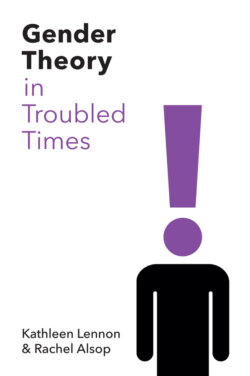Читать книгу Gender Theory in Troubled Times - Rachel Alsop - Страница 19
Psychological and behavioural sex differences and their biological anchorage
ОглавлениеThe second key assumption of much scientific work on sex differences is that the assumed division into male and female bodies is accompanied by other differences, associated psychological and behavioural dispositions, which have consequent effects on social positionality. There is, of course, disagreement as to what range of responses are supposed to be conditioned by sex differences in this way. Recurring themes concern greater aggression and competitiveness in men and greater nurturing qualities in women, greater spatial and abstract reasoning abilities in men and greater linguistic skills in women. The differences picked out are supposed both to causally explain and, sometimes, to justify the differing social positions that men and women typically occupy. ‘People with the female brain make the most wonderful counselors, primary school teachers, nurses, carers, therapists … People with the male brain make the most wonderful scientists, engineers … musicians, architects … toolmakers’ (Baron-Cohen 2003: 11). The defence of sex differences of this kind is given causal anchorage in the hormones and chromosomes that contribute to distinct bodily characteristics and/or evolutionary theory and/or in claimed physical differences in male and female brains. An example of this kind of thinking was found in discussions following the crash of Lehman Brothers, and consequently of the global financial sector, in 2008. There was speculation that the high-risk strategies and large-scale financial speculation which led to this crash would not have been pursued if the financial traders had not been predominantly men. And here the reference was not to learnt patterns of gendered behaviour but to the link between the supposed male hormone testosterone and risk-taking. ‘There is a very simple reason why most financial traders are youngish men. The nature of trading incorporates all the features for which young males are biologically adapted. … All the actions of testosterone are echoed by the qualities of a successful trader’ (Herbert 2015: 116–18, cited in Fine 2017: 151).
It is research into sex differences of this second kind which feminist writers were initially most concerned to contest. That is, they have been concerned to contest that psychological and behavioural differences are anchored primarily in biological ones. In the debates surrounding such research into psychological and behavioural sex differences there are two steps which need to be evaluated. First is the claim that there are empirically significant differences between the psychological characteristics and behavioural dispositions of those people classified as male or female, men or women. Second is the claim that these psychological and behavioural differences are to be explained by biological features, by hormones, genetic variations anchored in chromosomes, and/or differences in male and female brains – biological traits whose presence is frequently explained by evolutionary selection. As Deborah Cameron noted in 2007, from the 1990s a ‘steady trickle of books’ about the sex differences of men and women ‘began to develop into a raging torrent’; from scientific papers which appear to suggest cognitive or behavioural differences, to popular science books and self-help books designed to aid communication across the presumed gap between men (who are from Mars), and women (who are from Venus), to coin an ubiquitous current usage’ (2007: 2).
It is not possible here to give a comprehensive review of the research into psychological and behavioural sex differences, and there are some really excellent texts which provide a critical review of this work, from biologists, psychologists and historians of science (see, for example, Bleier 1984; Fausto-Sterling 1992, 2000; Fine 2012, 2017; Cameron 2007; Jordan-Young 2010). It is, however, worth looking at examples of currently active research to give a sense of the kinds of difficulties surrounding it. If biological explanations are to be offered for psychological and behavioural differences between men and women, then these differences must themselves be established. Clearly, if we look around us, wherever we are, there are a large number of psychological and behavioural differences between those classified as men and those classified as women. But if these are to be biologically based then they must not be differences that vary historically or cross-culturally. Moreover, once we add that restriction, then the characteristics for which we might seek biological explanations become much fewer and highly contested.
The biological explanations offered for the supposed differences currently utilize two, often interwoven, strands of theory. One is evolutionary psychology. The second is research into differences between male and female brains.
